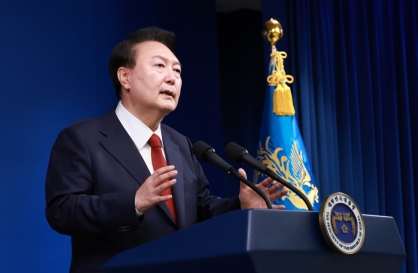Fifty years ago, African countries ― many of which newly wrested their independence from European colonial rule, came together to form the Organization of African Unity.
Now called the African Union, the regional body officially celebrated on Saturday the 50th anniversary of its establishment ― and the group had a lot to celebrate.
Economically, African countries have for years posted the fastest growth rates in the world. Politically, there are fewer civil conflicts on the continent and more democracies than ever before.
Last year, AU member states elected a new leader, Nkosazana Dlamini-Zuma, a veteran South African politician and the regional body’s first female chairperson.
But Korea has only recently engaged seriously with Africa and while, overall, Korean-African ties are increasing, the relationship appears to face challenges.
The 17 African nations with embassies here celebrated this AU milestone year with a plush banquet on Friday complemented with performances by dance groups from Nigeria and the Ivory Coast and an African cultural exhibition at Gwanghwamun Square on Saturday.
Now called the African Union, the regional body officially celebrated on Saturday the 50th anniversary of its establishment ― and the group had a lot to celebrate.
Economically, African countries have for years posted the fastest growth rates in the world. Politically, there are fewer civil conflicts on the continent and more democracies than ever before.
Last year, AU member states elected a new leader, Nkosazana Dlamini-Zuma, a veteran South African politician and the regional body’s first female chairperson.
But Korea has only recently engaged seriously with Africa and while, overall, Korean-African ties are increasing, the relationship appears to face challenges.
The 17 African nations with embassies here celebrated this AU milestone year with a plush banquet on Friday complemented with performances by dance groups from Nigeria and the Ivory Coast and an African cultural exhibition at Gwanghwamun Square on Saturday.

“Most of the issues tackled by the founding fathers are now seen as realizable: the integration of Africa, regional economic groupings, the free movement of people and goods and the breaking down of borders,” said Nigerian Ambassador to Korea Desmond Akawor who, as the longest serving African envoy in residence here, serves as the dean of the African group in the foreign diplomatic community.
“If you look at East Africa and southern Africa, they are almost getting to the point of zero-borders in terms of the movement of goods. In West Africa, a common currency will come into effect by 2015,” Akawor said in an interview with The Korea Herald at the Nigerian Embassy in Itaewon on Monday.
There are currently 17 African nations with diplomatic missions here, a rapid increase from 2005 when former President Roh Moo-hyun launched a serious foreign policy effort to expand Korea’s influence in the region. Two more countries ― Tanzania and Zambia ― have plans to open chanceries in Seoul this year, Akawor said.
Several African nations saw peaceful transitions of power to opposition candidates, a sign democracy is firming up in African soil. Recent Kenyan elections, which saw a change in government and Uhuru Kenyatta sworn in as the East African nation’s new president in March, bore this out.
There were other African elections in which incumbent leaders accepted defeat, too. Zambia’s Rupiah Banda in 2011 and Senegal’s Abdoulaye Wade in 2012 saw losing candidates heeding the verdict of the ballot box and the courts.
“Former African leaders are taking up the role of election monitors. Look at the election in Senegal.
“My former president Olusegun Obasanjo, was right there on the spot. He was one of the persons to tell (Former Senegalese Abdoulaye Wade): ‘My friend, it is time to go,’” Akawor said.
The ambassador said that while Korea and Africa as a whole are inching toward closer and closer ties, more needs to be done.
At the same time, bilateral trade is growing fast but from a low level: Trade with Africa increased fourfold to $22 billion in 2011 from $5.5 billion in 2000. Korea represents about 2.5 percent of Africa’s global trade, yet Africa accounts for just 2 percent of Korea’s.
“If you look into what that trade consists of, too, you see it is mining and retail goods, cars and electronics,” Akawor said.
“One had expected that by today, in the area of mining for example, some value added inputs would be there. There should have been investment in processing factories in specific countries where Korea is involved in mining operations, for example, in Madagascar, Zambia and South Africa,” he said.
There is reason to believe the relationship will improve as well, he said: If Korea links up with Africa in win-win partnerships.
“Africa has most of the things that Korea needs. Korea is a nation that needs energy. Hydrocarbons are available in Africa. Land is another resource Africa has that Korea needs.”
But Akawor pointed to Daewoo Logistics experience in Madagascar as a cautionary tale.
Daewoo Logistics made headlines around the world in 2009 it inked a 99-year lease for 3.2 million acres, half of Madagascar’s arable land, to grow palm oil and corn for biofuels for shipment back to Korea as food crops.
The Madagascar deal would have been the biggest involving foreign firms seeking to secure African farmland when food prices soared in 2008.
Akawor described the Daewoo Logistics venture as “neo-colonialism.”
News of the multi-million-acre land deal incited massive demonstrations that killed about 170 people and eventually pushed the island nation’s president, Marc Ravalomanana, out of office in March 2009.
Andry Rajoelina, opposition leader and then-mayor of Madagascar’s capital city of Antananarivo, declared himself the new president in a move widely condemned as a coup d’etat by the international community. The African Union brokered new elections tentatively slated for July.
“We discovered that the relationship between Korea and Africa in terms of those transactions is not really healthy when you look at such activities,” Desmond said about the situation in Madagascar. “What Africa needs are genuine partnerships.”
By Philip Iglauer (ephilip2011@heraldcorp.com)
-
Articles by Korea Herald










![[K-pop’s dilemma] Time, profit pressures work against originality](http://res.heraldm.com/phpwas/restmb_idxmake.php?idx=644&simg=/content/image/2024/05/08/20240508050705_0.jpg&u=20240508171126)








![[Today’s K-pop] Stray Kids to drop new album in July: report](http://res.heraldm.com/phpwas/restmb_idxmake.php?idx=642&simg=/content/image/2024/05/09/20240509050659_0.jpg&u=)